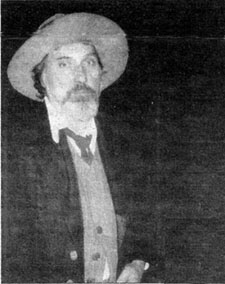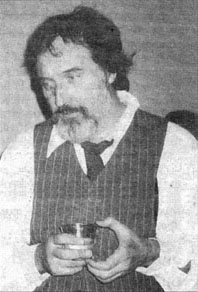The Islander – Sanibel, Florida
A stirring one-man performance
by Ruth Iyengar
On Thursday, Jan. 29, Walt Whitman came limping into Schein Hall from a side aisle with his cane and greeted the audience with “How’d you do? “How’d you do?” From that moment on, you felt an immediate rapport with the man who heard America singing.
Collins as older Whitman
Stephen Collins brilliantly portrayed Whitman in Unlaunch’d Voices, a one-man play, conceived by him, written and directed by Michael Keamy and, heretofore, performed across New England. During the evening Whitman was transformed from a man of 70 to a young man of 37, then back again to a 70-year-old.
We felt Whitman’s ecstasy as he lay on the beach next to his lover. “When I heard at the close of day…And his arm lay lightly around my breast – and that night I was happy.” Yet later, how well we knew his pain as he fell on his knees in utter torment, head in hands, realizing full well the lifelong struggle he would endure with his sexuality. (The word homosexual did not even enter the lexicon until the 1880s.)
During the Civil War Whitman was moved to spend time – four years in all – in hospitals and camps tenderly caring for the wounded and dying soldiers, most of them in their mid-teens. As Whitman knelt by the dying Civil War soldier on the battlefield, you sensed his loss. When writing to the boy’s parents he described how their son looked – his vibrant eyes, his flowing hair – words of comfort to a grieving family. The actor’s eyes were filled with tears when, as Whitman, he walked through the makeshift hospitals, stopping to grasp a hand, caress a forehead, cover a dead body with a blanket, tucking it over and around the boy’s head and feet. The deep emotions he felt resonated with the audience as they related to today’s world – more war, more loss, more grief.
With salt and pepper beard and 6-foot-5-inch height, Stephen Collins resembles Whitman. His commanding voice modulates effectively – frail when portraying the 70-year-old, robust and vibrant at 37. The gray felt hat Collins wore was Whitman’s signature piece. A black frock coat was worn over a vest, white shirt with red tie, and trousers. When Whitman was transformed to a much younger man, the frock coat, vest and tie were quickly tossed aside. We see the familiar Whitman swagger as he strolled down a Boston street thinking “Look at me, America. I am Walt Whitman!”.
The set for Unlaunch’d Voices was cleverly arranged by Linda Kramer with 19th Century antiques – a desk, rattan chair with cushions, a book stand, numerous books strewn everywhere, and oriental rugs. Collins’ movements down the center aisle during the performance – connecting with the audience, asking a question, looking directly at someone – lent an intimacy to the evening.
Collins as young Whitman
Whitman ruminates on the failure of Leaves of Grass in the U.S. and reads a letter of praise from Ralph Waldo Emerson (which he printed in the second edition of Leaves without Emerson’s approval)… but then speaks of arguing with Emerson, defending the integrity of Leaves against Emerson’s suggested edits. In his later years, Whitman was supported by a group of English writers who believed in his work.
If the measure of a life lies in the acceptance by one’s peers, Whitman himself probably would have conceded that his life was a failure. If the measure lies in being true to oneself, then Whitman’s stubborn insistence on writing only the truth, in his own voice, in Leaves of Grass created an American legacy that will never fade far from view.
Ruth Iyengar has been a member of the Sanibel community for some years and is presently serving on the BIG Arts On Stage committee.
– Karen Nelson contributed to this review as well


